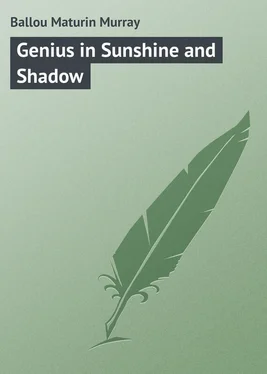Maturin Ballou - Genius in Sunshine and Shadow
Здесь есть возможность читать онлайн «Maturin Ballou - Genius in Sunshine and Shadow» — ознакомительный отрывок электронной книги совершенно бесплатно, а после прочтения отрывка купить полную версию. В некоторых случаях можно слушать аудио, скачать через торрент в формате fb2 и присутствует краткое содержание. Жанр: foreign_prose, foreign_humor, Анекдоты, на английском языке. Описание произведения, (предисловие) а так же отзывы посетителей доступны на портале библиотеки ЛибКат.
- Название:Genius in Sunshine and Shadow
- Автор:
- Жанр:
- Год:неизвестен
- ISBN:нет данных
- Рейтинг книги:4 / 5. Голосов: 1
-
Избранное:Добавить в избранное
- Отзывы:
-
Ваша оценка:
- 80
- 1
- 2
- 3
- 4
- 5
Genius in Sunshine and Shadow: краткое содержание, описание и аннотация
Предлагаем к чтению аннотацию, описание, краткое содержание или предисловие (зависит от того, что написал сам автор книги «Genius in Sunshine and Shadow»). Если вы не нашли необходимую информацию о книге — напишите в комментариях, мы постараемся отыскать её.
Genius in Sunshine and Shadow — читать онлайн ознакомительный отрывок
Ниже представлен текст книги, разбитый по страницам. Система сохранения места последней прочитанной страницы, позволяет с удобством читать онлайн бесплатно книгу «Genius in Sunshine and Shadow», без необходимости каждый раз заново искать на чём Вы остановились. Поставьте закладку, и сможете в любой момент перейти на страницу, на которой закончили чтение.
Интервал:
Закладка:
"The lawless science of our law,
That codeless myriad of precedent,
That wilderness of single instances."
When we observe good workmanship, whether it be by a stone-mason, a cabinet-maker, or a writer, we may be sure that it has cost much patient labor. His biographer tells us that Moore thought ten or fifteen lines in twenty-four hours a good day's accomplishment in poetry; and at this rate he wrote "Lalla Rookh." 52 52 His publishers paid Moore three thousand guineas for the copyright of "Lalla Rookh," his favorite production; and the liberal purchasers, Longman & Co., had no reason to regret their bargain. When Moore's "Lalla Rookh" first appeared, the author was terribly taken aback in company by Lady Holland, who said to him, "Mr. Moore, I don't intend to read your Larry O'Rourke; I don't like Irish stories!"
Wordsworth wrote his verses, laid them aside for weeks, then, taking them up, frequently rewrote them a score of times before he called them finished. Buffon's "Studies of Nature" cost him fifty years of writing and re-writing before the work was published. John Foster, the profound and eloquent English essayist, often spent hours upon a single sentence. Ten years elapsed between the first sketch of Goldsmith's "Traveller" and its final completion. Rochefoucauld 53 53 Madame de Lafayette was a warm friend of Rochefoucauld. She was intimately allied to the clever men of the time, and was respected and loved by them. The author of the "Maxims" owed much to her, while she also was under obligations to him. Their friendship was of mutual benefit. "He gave me intellect," she said, "and I reformed his heart."
spent fifteen years over his little book of Maxims, altering some of them thirty times. Rogers admitted that he had more than once spent ten days upon a single verse before he turned it to suit him. Vaugelas, the great French scholar, devoted twenty years to his admirable translation of "Quintus Curtius."
Some authors have produced with such rapidity as to approach improvisation. Perhaps the most remarkable instance of this was in the case of Lope de Vega, who composed and wrote a versified drama in a single day, and is known to have done so for seven consecutive days. Contemporary with Shakespeare and Cervantes, De Vega has left behind him two thousand original dramas sparkling with vivacity of dialogue and richness of invention. Soldier, duellist, poet, sailor, and priest, his long life was one of intense activity and adventure. 54 54 His enemies having declared that De Vega's dramas were not judged upon their merit, but were popular because they bore his name, – to try the public taste he wrote and published a book of poems anonymously, entitled "Soliloquies on God." Their merit was undisputed, and they were vastly popular, until the carping critics threatened him with the unknown author as a rival. His triumph when he claimed them as his own was complete.
The name of Hardy, the French dramatic author and actor, occurs to us in this connection; though an inferior genius to De Vega, he wrote over six hundred original dramas. He was considered the first dramatic writer of the days of Henry IV. and Louis XIII., before whom Hardy often appeared upon the stage personating the heroes of his own dramas.
Prynne, the English antiquary, politician, and pamphlet-writer, sat down early in the morning to his composition. Every two hours his man brought him a roll and a pot of ale as refreshment; and so he continued until night, when he partook of a hearty dinner. One of his pamphlets was entitled "A Scourge for Stage-Players," which was considered so scurrilous that the Star-Chamber sentenced him to pay a heavy fine, to be exposed in the pillory, to lose his ears, and to be imprisoned for life. He was finally released from prison. While he was confined in the pillory, a pyramid of his offending pamphlets was made close at hand, to windward of his position, and set on fire, so that the author was very nearly choked to death by the smoke. He was almost as incessant and inveterate a writer as Petrarch, and considered being debarred from pen and ink an act more barbarous than the loss of his ears. However, he partially obviated his want of the usual facilities by writing a whole volume on his prison walls while confined in the Tower of London.
Byron wrote the "Corsair" in ten days, which was an average of nearly two hundred lines a day, – a fact which he acknowledged to Moore with a degree of shame. He said he would not confess it to everybody, considering it to be a humiliating fact, proving his own want of judgment in publishing, and the public in reading, "things which cannot have stamina for permanent attention." The surpassing beauty of the "Corsair," however, excuses all the author said or did in connection with it. It may nevertheless be affirmed that, as a rule, no great work has ever been performed with ease, or ever will be accomplished without encountering the throes of time and labor. Dante, we remember, saw himself "growing lean" over his "Divine Comedy." Mary Russell Mitford, the charming English authoress, dramatist, poet, and novelist, who so excelled in her sketches of country life, says of herself: "I write with extreme slowness, labor, and difficulty; and, whatever you may think, there is a great difference of facility in different minds. I am the slowest writer, I suppose, in England, and touch and retouch incessantly." Her life was one of constant labor and self-abnegation in behalf of a worthless, selfish, and imperious father. He was a robust, showy, wasteful profligate, and a gambler. A doctor by profession, he was a spendthrift and sensualist by occupation. He contracted a venal marriage with an heiress much older than himself, and after squandering her entire fortune he fell back upon his daughter as the bread-winner for the whole family. By a remarkable chance she became the possessor of a great lottery prize, from which she realized twenty thousand pounds, every penny of which her beastly father drank and gambled away. Still, the devotion and industry of the daughter never waned for a moment. Her patient struggles have placed her name on the roll of fame, while her father's has sunk into deserved oblivion.
De Tocqueville wrote to his publishers: "You must think me very slow. You would forgive me if you knew how hard it is for me to satisfy myself, and how impossible it is for me to finish things incompletely." Horace suggested that authors should keep their literary productions from the public eye for at least nine years, which certainly ought to produce "the well-ripened fruit of sage delay." After a labor of eleven years Virgil pronounced his Æneid imperfect. This recalls the Italian saying, "One need not be a stag, neither ought one to be a tortoise." Tasso's manuscript, which is still extant, is almost illegible because of the number of alterations which he made after having written it. Montaigne, "the Horace of Essayists," could not be induced, so lazy and self-indulgent was he, to even look at the proof-sheets of his writings. "I add, but I correct not," he said.
The writer of these pages has seen the original draft of Longfellow's "Excelsior," so interlined and amended to suit the author's taste as to make the manuscript rather difficult to decipher. The poet wrote a back-hand, as it is called; that is, the letters sloped in the opposite direction from the usual custom, and as a rule his writing was remarkably legible. Coleridge was very methodical as to the time and place of his composition. He told Hazlitt that he liked to compose walking over uneven ground, or making his way through straggling branches of undergrowth in the woods; which was a very affected and erratic notion, and might better have been "whipped out of him." 55 55 Coleridge tells us how he was once cured of infidelity by his teacher. "I told Boyer that I hated the thought of becoming a clergyman. 'Why so?' said he. 'Because, to tell you the truth, sir,' I said, 'I'm an infidel!' For this, without further ado, Boyer flogged me, – wisely, as I think, soundly, as I know. Any whining or sermonizing would have gratified my vanity, and confirmed me in my absurdity; as it was, I was laughed at, and got heartily ashamed of my folly."
Wordsworth, on the contrary, found his favorite place for composing his verses in walking back and forth upon the smooth paths of his garden, among flowers and creeping vines. Hazlitt, in a critical analysis of the two poets, traces a likeness to the style of each in his choice of exercise while maturing his thoughts, – which, it would seem to us, is a subtile deduction altogether too fine to signify anything.
Интервал:
Закладка:
Похожие книги на «Genius in Sunshine and Shadow»
Представляем Вашему вниманию похожие книги на «Genius in Sunshine and Shadow» списком для выбора. Мы отобрали схожую по названию и смыслу литературу в надежде предоставить читателям больше вариантов отыскать новые, интересные, ещё непрочитанные произведения.
Обсуждение, отзывы о книге «Genius in Sunshine and Shadow» и просто собственные мнения читателей. Оставьте ваши комментарии, напишите, что Вы думаете о произведении, его смысле или главных героях. Укажите что конкретно понравилось, а что нет, и почему Вы так считаете.












